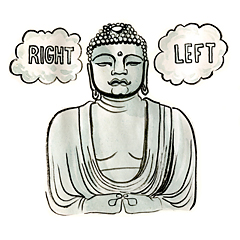Dear Abbey Dharma, In my lifetime of professional work in Canadian social service, I have gone from being left-leaning to Social Conservative. I don’t find a place for myself in any Western Buddhist sangha where being politically left is the norm. Even my current dharma teacher spews out hateful speech against just about anyone and everything on the right side of the spectrum. I have a hard time listening to a Buddhist teacher going on about how much he despises George W. Bush or Sarah Palin or people like me. No one but me even notices, or at least is affected by it. How can I remain part of the Western Buddhist community under these conditions?—Up North
Dear Up North, I would also have several reasons for not trusting the wisdom of a Buddhist teacher who, as you say, “goes on about how much he despises” or “spews out hateful speech” about any particular group of people. My first reason for not trusting his wisdom is his manner of speech, which is abusive. Another is the ignorance shown by stereotyping groups of people, such as “the right” or “the left,” as categorically unworthy. Another reason is the teacher’s apparently fixed attachment to a view.
I think it is difficult these days to keep a balanced mind about politics. Morality, decency, and kindness (fundamental spiritual virtues) have been claimed by both the right and the left as their core values. Political opponents are presented as enemies rather that adversaries, villains rather than committed civil servants with differing views. The issues— world peace, planetary survival— can be frightening. When I am frightened, I have trouble remembering that my view is just a view and that I could be wrong.
I think that calling oneself a Buddhist implies a dedication to non-greed, non-hatred, and non-delusion—a dedication that certainly transcends political stance. It would be wonderful if our sanghas welcomed political diversity and used practices of skillful speech to explain our opinions to one another. In situations that do not feel combative to me, I can work collegially. I can modify my position to accommodate others. I can recognize situations in which an attachment to a particular view has kept me from realizing a larger truth. What if we, as Buddhists in communities, were a model for the world political community?
